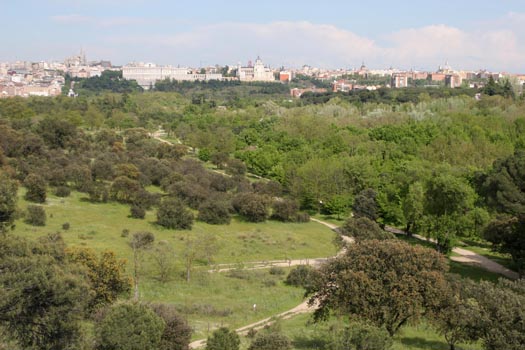A Fairy Encounter in Nineteenth-Century Madrid September 10, 2012
Author: Beach Combing | in : Modern , trackback***And so it begins… first class today: unpleasant warm fuzzy feeling in stomach, awareness that no more proper research for six months***
Beach just stumbled across this curious account of a sighting of little people in Madrid in the 1860s. The witness was a nineteenth-century spiritualist: the account begins with her own curious take on the question.
In classical countries the belief has been in Nymphs of the fountain, or grove, in Fauns, in Satyrs, in Cyclopes, in Centaurs, such as the one who first astonished Saint Anthony in his journey through the forest. We have read that these invisible creatures (or animals, as the Italian monk I have quoted at such length called them, are supposed to dwell in the four elements, earth, air, fire, and water. The Scandinavians call those of the air white Elves; and those of the earth, black. Whatever was genial, light, playful, and benevolent, came from the former; the latter did all the work that was dark, cruel, and rapacious. Naturally enough, the mining districts are said to be full of them, and in the mines they may be seen extracting the ore, and often lead the miners to discover rich veins of mineral. They are said to be seen in an occasional peep through an aperture of a hill, and are called Gnomes and Kobolds…
In any case, to the event:
[S]ome eight years ago, I unmistakably saw two of them in the following manner: It was at a time when my mediumistic power, which is variable, was stronger than at others; we were taking our afternoon drive in the well- wooded grounds of the Casa de Campo, a private park of the Queen’s near Madrid, when we met, and passed, with merely a salutation, a well-known English gentleman, who, like ourselves, had the privilege of the entree to that delicious retreat, and who, evidently fond of solitude and exercise, we had often thus seen indulging himself with an afternoon ramble on foot. On the afternoon in question, we passed him as usual, at a slow pace; I was sitting with my back to the horses, and distinctly saw that he was closely followed by two ‘little men’, whose appearance I find it most difficult to describe on paper, though I have done so verbally hundreds of times; they were very tight and shiny, as round and sleek and tight-looking as porpoises, to which I would liken them more than anything else, for they were almost of the same colour; their faces were kind and smiling, almost comic, and as they passed they grinned and turned a somersault, and then holding up their short little arms like fins, and raising their fore-fingers like the comic images of the Chinese Mandarins, they ludicrously imitated the steps of the grave English gentleman, and continued to follow him as if it was a part of the business of their lives to be his personal attendants. Strange to say, I was not so much astonished at their appearance at the moment as I was the moment they were out of sight, and as I have been since, whenever I have thought or spoken about them, just as if such an apparition was quite to be expected in sylvan shades on summer afternoons, for I think it better to tell my readers distinctly it was summer time, and not carnival, lest it might be supposed these two figures were mere masquerading merry-makers; had they been so, they would of course have been seen by others of my party.
Too long out in the midday sun? drbeachcombing AT yahoo DOT com
***
13 September 2012: Trevor from FollowtheBaldie.com writes: Perhaps your spiritualist might have come to less remarkable conclusions re the rest of the company’s lack of interest in her sighting had she visited Las Meninas in el Prado. As you know, dwarf retainers are a regular feature of Iberian romances, Arbiol says they’re still being employed in the early C18th , and I believe there’s a sighting of this type somewhere in Baroja’s chaotic compendium of mid-C19th weirdness, Memorias de un hombre de acción. Thanks Trevor!



